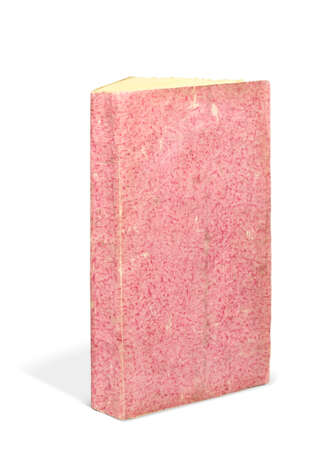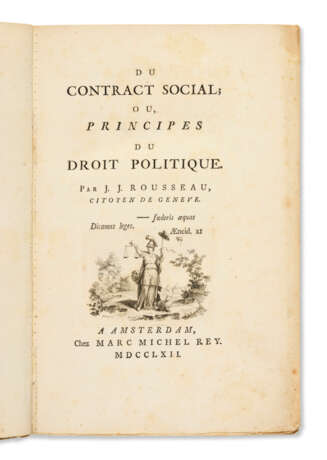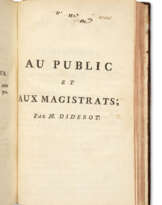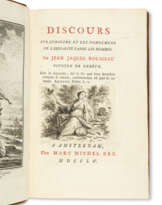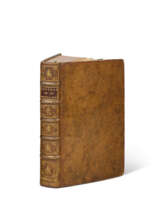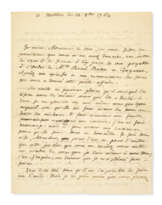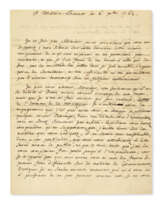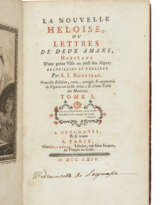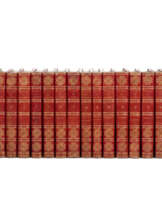ID 1317641
Lot 48 | ROUSSEAU, Jean-Jacques (1712-1778)
Estimate value
€ 40 000 – 50 000
Du Contract social; ou, Principes du Droit politique. Par J.J. Rousseau, citoyen de Genève. Amsterdam : Marc Michel Rey, 1762.
Édition originale.
"The Contrat Social remains Rousseau's greatest work. [...] In the Age of Reason he advocated the greater force of intuition: against artificial refinement, he urged a return to the natural state. So, observing that under the French monarchy the effect of government was the greatest misery of the greatest number, his convinced and sincere republicanism needed to look no further. [...] His fundamental thesis that government depends absolutely on the mandate of the people, and his genuine creative insight into a number of political and economic problems, give his work an indisputable cogency. It had the most profound influence on the political thinking of the generation following its publication. It was, after all, the first great emotional plea for the equality of all men in the state : others had argued the same cause theoretically but had themselves tolerated a very different government [...] it remains a crucial document of egalitarian government" (PMM).
"Le Contrat social est un livre qui tranche et s'élève à la plus haute beauté philosophique, l'enchaînement nécessaire des chapitres et des livres, la grandeur architectonique placent Rousseau à égalité avec Hobbes ou Spinoza" (Yves Peyré, En francais dans le texte).
Dufour, 133 ; Rousseau, Oeuvres complètes, Gagnebin, III, pp. 1868 et suiv. ; PMM, 207 ; En francais dans le texte, 162 ; Tchemerzine, V, p. 543.
Rarissime exemplaire sur grand papier ou "papier royal", broché, à grandes marges.
L'exemplaire porte le titre du tirage A avec la mention "du Contract social ;" et la vignette représentant la Justice gravée par Boily d'après B. Bolomey. Il contient aussi le faux-titre et les pages 221-223 ne comportent pas la note sur mariage civil, caractéristiques du tirage B.
Gagnebin décrit le tirage A avec le faux-titre. Néanmoins, le retirage du titre vient du fait que Rousseau le trouvait "trop confus" (lettre à Rey, 28 février 1762) dans son premier état. Dufour indique : "Rey dut alléger le titre en ôtant les trois premières lignes ["Du contract social ;"], qui firent le faux-titre" (Dufour, pp. 118-119). La présence sur faux-titre pour le tirage "A" ne semble donc pas avérée.
Un autre exemplaire sur grand papier fut vendu le 25 juin 2009 chez Christie's France - "Bibliothèque littéraire d'un amateur parisien". Broché également, il mesurait 198 x 120 mm soit 2 cm de moins en hauteur et presque 3 cm en largeur. Portant le titre du tirage A, il ne comportait pas de faux-titre.
Les échanges épistolaires entre Rousseau et son éditeur Marc-Michel Rey évoquent tôt dans le processus d'édition l'attention de l'auteur à la qualité du papier. Dès octobre 1761, il indique à Rey apprécier le papier des épreuves qu'il a reçu : « Si le papier de l’épreuve est celui de l’édition, j’en suis fort aise. Si malheureusement il ne l’est pas, je vous prie au moins de faire tirer quelques-uns de mes exemplaires sur ce même papier-là ». Quelques mois plus tard, alors que les corrections sont en cours, Rey confirme : « Je ferai tirer pour vous des exemplaires sur le papier que vous me demandez et j’en ferai tirer encore sur un papier très beau qui me coûte 30 livres de France la rame : je le fais avec grand plaisir, espérant que cela vous sera agréable. »
On sait que l'ouvrage fut imprimé sur quatre papiers différents : les exemplaires sur papier « ordinaire », comparable à celui utilisé pour le Discours sur l’inégalité ; d'autres sur papier « de poste », plus petits ; et deux grands papiers, le « Royal » que Rey décrit comme « beaucoup plus épais et pesant que le papier ordinaire » et le « super-Royal », qui est celui qui coûte « 30 livres (...) la rame ».
D'après les échanges entre Rey et Rousseau, il semble qu'il y ait eu moins d'une vingtaine d'exemplaires imprimés sur papier royal et à peine une poignée sur super-royal.
In-8 (218 x 148 mm). Broché, couverture de papier d'époque dominoté rose. Faux-titre, titre (du tirage A, avec mention "Du Contract Social" et vignette représentant la Justice), Avertissement, table, 223 pp., sans la note sur le mariage civil, catalogue de l'éditeur. Étui-chemise moderne. (La couverture de papier du temps, semble être rapportée. Il n'apparaît cependant pas que l'exemplaire a jamais été relié. Infimes rousseurs au faux-titre et au titre, couverture de papier légèrement frottée et salie).
Large paper copy of the first edition of one of the greatest political philosophy essays ever published that led to the most decisive changes in the modern world.
23 x 16 x 4 cm.
| Address of auction |
CHRISTIE'S 8 King Street, St. James's SW1Y 6QT London United Kingdom | |
|---|---|---|
| Preview |
| |
| Phone | +44 (0)20 7839 9060 | |
| Buyer Premium | see on Website | |
| Conditions of purchase | Conditions of purchase |
